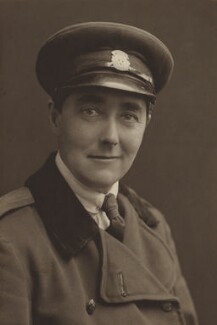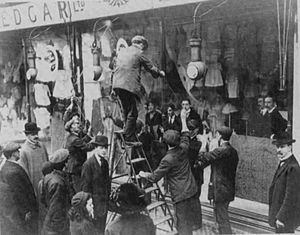Olive Grace Walton facts for kids
Quick facts for kids
Olive Grace Walton
|
|
|---|---|

Olive Grace Walton by Olive Edis, circa 1920
|
|
| Born | 1886 Tunbridge Wells, Kent, England
|
| Died | 1937 (aged 50–51) |
| Nationality | British |
| Occupation | Suffragist |
Olive Grace Walton (1886–1937) was a brave British woman who fought for women's right to vote. She was part of a group called the Suffragettes. She was arrested three times and even went to prison twice. While in prison, she went on a hunger strike to protest. This meant she refused to eat, and she was then force-fed.
Contents
Fighting for Women's Rights
Walton was born in 1886 in Tunbridge Wells, England. Her father was a wine merchant. She felt a bit less smart than her brother and sister. This was because she had only learned cooking and art. Her parents sent her to London to do social work.
Around 1908, Olive joined a group called the National Union of Women's Suffrage Societies. Later, she became an important secretary for the more active Women's Social and Political Union. This group worked hard to get women the right to vote.
First Arrest and Imprisonment
On November 21, 1911, Olive was arrested. She was protesting a new law that would still not let women vote. She spent one week in Holloway Prison.
Window Smashing Protest
Olive was arrested again in 1912. This time, it was for breaking windows during a protest. She and Eileen Casey broke windows on Oxford Street in London. One of the places was a store called Marshall & Snelgrove.
She was sent to Aylesbury Prison. There, she went on a hunger strike. This meant she refused to eat to protest her unfair treatment. Because of this, she was force-fed. This is when prison staff make someone eat, even if they don't want to.
Olive once said she heard a band playing "The March of the Women" outside the prison. She also saw people waving flags with their colors. She said it made her long to be free. The women on hunger strike were force-fed three times a day. Olive said they had "fine tussles" before being tied into a chair.
On other days, the Suffragette prisoners played games to stay positive. They played obstacle races and golf with sticks and stones. They even played tennis using a prison bench as a net. Olive said her legs became "very thin and shaky." The women could shorten their prison time by making aprons. The prison governor didn't mind when they sewed slogans like "Deeds not Words" onto them. However, they had to unpick them before leaving prison.
Hunger Strike Medal
Because of her bravery, Olive was given a special award. It was called the Hunger Strike Medal. The Women's Social and Political Union gave it to her "for Valour."
Third Arrest
Olive was arrested a third time in 1914 in Dundee, Scotland. She threw a ball through the window of a train carriage. This carriage belonged to King George and Queen Mary. However, no official charges were filed against her.
After the Protests
In 1914, when World War I began, Olive joined the Women Police Volunteers. Later, in 1920, she joined the Women's Auxiliary Service of the Royal Irish Constabulary. After a motorcycle accident, she became a hospital almoner. An almoner helps patients with their social and financial needs.
Personal Life
Olive's strong involvement in the Suffragette movement caused some distance with her family. She had a unique personal style. She wore her hair short and often dressed in a suit and tie.
Olive never married. She adopted an orphan girl and named her Christabel. Olive was a vegetarian. She also supported the Labour Party and the miners' actions in the 1920s.
Olive Grace Walton passed away in 1937 due to cancer.
 | Kyle Baker |
 | Joseph Yoakum |
 | Laura Wheeler Waring |
 | Henry Ossawa Tanner |


